
Scrabble Players Group Removes Racial, Ethnic Slurs From Tournament Word List
With members split between those opposed to slurs and those who value more words to play, the North American Scrabble Players Association decided to remove more than 200 words from the official lexicon used for its competitions.
In a move that pitted the executive team against an advisory board and a segment of the membership, the North American Scrabble Players Association has chosen to eliminate 200-plus racial and ethnic slurs from its official play list.
John Chew, NASPA’s CEO, said that despite internal debate, it is the right time for the move. “It’s time to get rid of language that, if used at a Scrabble tournament—if it wasn’t on the board—would get you kicked out,” he said, noting the organization’s code of conduct prohibits discrimination.
The official word list, or lexicon, is what NASPA uses to determine eligible words at tournaments. While the Scrabble Dictionary is well-known to the public, it is a separate product owned by Hasbro and does not include slurs. Chew said a common attitude among some NASPA members is that words in Scrabble have no meaning, that they are just tiles to be played for points, and people should not get upset when words are played.
While some members emphatically believe this, Chew said the wider world doesn’t. When members were polled about using slurs in game play, they were almost equally divided on removing slurs, but when the public was polled, 92 percent opposed keeping slurs.
“You can represent your membership, but if you stick by that, we’re not going to have a membership,” Chew said. “Our existing membership views are at odds with what is going on in society.”
NASPA has an advisory board that counsels the decision-making executive committee. Chew had hoped to get more buy-in by having that board vote for the change.
“I told them, ‘We are not going to be able to conduct ourselves as a business if we continue to have slurs,’” Chew said. “If we say we are an organization that wants to spell out the N-word with tiles, there are not many that are going to want to have a business relationship with us. We are not going to find venues willing to host our tournaments.”
While the advisory board voted against Chew’s proposal to remove slurs, the executive committee, which had final say, agreed to the change. Ideally, slurs will be removed by September, but the list—one that initially included 236 words—is still being reviewed. “We don’t want to get it wrong,” Chew said. “Any time you deal with human language, there are nuances.”
NASPA adds words to its lexicon every two to four years, and Chew said no slurs would be added going forward. While the membership was split in the online poll, Chew said he’s gotten more positive email responses than negative ones, and he thinks this is an issue that most members will move past soon enough.
“I think 90 percent of the association just wants to get back to playing games,” Chew said.
That said, he knows some will never forget the change. “Years ago, I removed an obscure three letter word, ‘EMF,’” Chew said, noting it is an abbreviation for electromotive force. “I still get people walking up to me saying, ‘Why did you have to remove it?’ It will be like that for the rest of my life.”
(Juanmonino/iStock Unreleased)






Comments